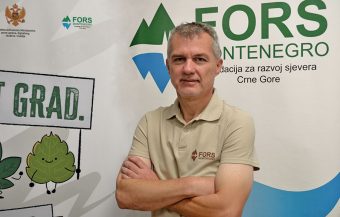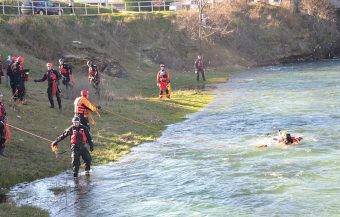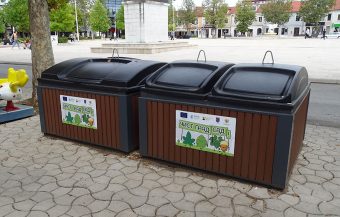
Anon-profit, regional organization that advocates for socio-economic development, environmental protection and improvement of civil society, the Foundation for the Development of Northern Montenegro (FORS Montenegro) was founded 17 years ago, based on the idea of helping municipalities, public institutions, and public companies implement strategies and action plans, under the auspice of projects funded by the European Union programme. FORS has different fields of activity – from ecology, health and emergency situations to sports, culture and other areas.
We spoke with Veselin Šturanović, Executive Director of FORS Montenegro, about the Foundation’s work, its contribution to improving the quality of life of citizens, projects to improve environmental protection, the interest shown by municipalities and public companies in cooperation with the Foundation, as well as the well-deserved recognition.
He says that initially, the Foundation mainly worked with municipalities from the northern part of Montenegro – Pljevlja, Berane, Bijelo Polje, Nikšić, Plav and Rožaje. Still, over time, their work spread to the entire country. The Foundation is exclusively project-oriented and has no other income, so the team size depends on the number of projects they implement.
“There are four people in our permanent team, and when the number of projects increases, we hire more associates. We consistently perform tasks and try to raise the figurative bar every day because it is beneficial for achieving a good working form,” says Mr. Šturanović and adds that their job is not easy because there are no working hours. They are always available to their partners. Because they are convinced that they are doing the right thing, the work at the Foundation is fulfilling, and because of that, it is much easier to do it.
IN FOCUS:
- RESPONSIBLE BUSINESS SUPPORTS THE COMMUNITY
- WHAT IS ESG AND WHAT CHANGES DOES IT BRING?
- FROM PRESERVING HISTORY TO AN ENERGY-EFFICIENT TOWN
Q: In what way and through which projects do you contribute to boosting environmental protection and the development of the local community?

A: The environment is one of the directions the Foundation focuses on, and the current situation in that segment could be better because worldwide, countries need to pay attention to the warnings our planet has been sending us. As part of the projects, we cooperate with services responsible for environmental protection, which can adopt preventive and punitive policy measures. Those two things should work side by side, and we must not give up on insisting that everyone is sanctioned in line with the relevant regulations and in proportion to the violation they committed. Combining these two factors and the proper application of regulations should bring better results.
Our task is to help public services that deal with the environment in various ways, helping them acquire proper equipment, like a utility company getting a waste collection truck, acquire the equipment they need or help them replace the worn one. Our goal is to inform the state and local decision-makers with the data and analysis that will serve them in planning and adopting acts required for regulating disposal and waste management. We are also trying to help them do their job better to meet the needs of citizens in the best possible way, which is our general goal.
Via projects such as the Cross-Border Initiative for Environmental Protection and the Cross-Border Green Deal, we try to help as much as possible. The goal of the first project, which was implemented in Nikšić and Trebinje, was to boost the capacity of institutions dealing with environmental protection through training, procurement of valuable equipment and vehicles for rubbish removal and inspection activities, as well as informing the population about the importance of improving the solid waste management system and complying with standards.

The goal of the second project, which is underway, is to improve the quality of services in the environmental protection and waste management sectors and raise the population’s awareness about the importance of environmentally responsible behavior in preserving the environment and natural resources. The second project envisages the procurement of rubbish collection vehicles for the utility company in Berane and the procurement of all-terrain vehicles for environmental protection services. We will start implementing the NRGCOM project (Creating Adequate Operational Conditions for Energy-Sustainable Communities in the Danube Region). In addition to us from Montenegro, our project partners come from Serbia and ten other countries located in the Danube Basin. The project goal is to encourage the expansion of energy communities by creating an appropriate environment for their adequate functioning.
Q: How do you identify problems that need to be solved or improved? Why did you choose the slogan “Action, Not Words”?
A: Every person who shares a problem they face in business helps us draft a project. We don’t just sit in an office the entire day; we talk to people, analyze their needs, and put them in the context of a valid strategy in that area. Then, we compare it with what the donor requires and single out the best ideas. We chose the motto “Action, Not Words” because we don’t want to talk too much – anyone can do that. We want to show through action what we support. This, in our opinion, is the only correct way.
Q: Why do donors choose to cooperate with FORS? What is the basic criterion for supporting your projects?
A: FORS gets projects only at competitions launched in the EU, as the EU is our main donor. They search for organizations that can best fulfil their mission and goals. Our experience is that those organizations that best represent what they want to achieve will get funding for their project. It is also very important if a certain organization has experience in the respective field, has previously successfully implemented projects in similar fields, and has established capacities to administratively and financially implement what it proposed in the project. These factors are considered when projects are evaluated, and they will tell you whether you are above or below the line for approval. Those below the line will take a chance next time.
Interviewed by: Mirjana Vujadinović Tomevski
Read the story in the new issue of the Energy portal Magazine RESPONSIBLE BUSINESS



